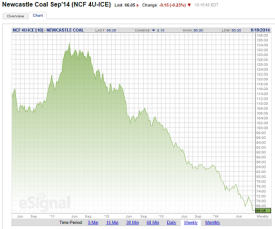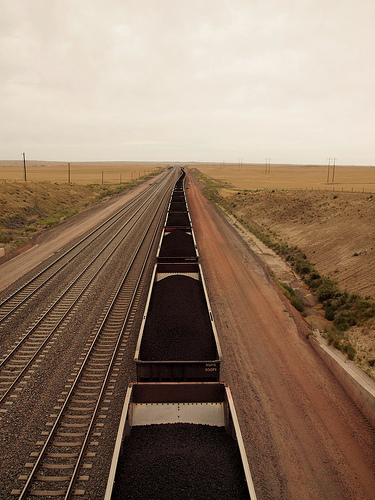It’s been a tumultuous month for proponents of massive coal export terminals in BC, Washington, and Oregon. In fact, there’s been so much news that it’s been hard to keep track of it all.
So here’s a synopsis of the month’s biggest stories:
- Oregon’s denial of the Morrow Pacific coal export project has sent would-be coal exporters into a panic.
On August 18 Oregon denied a key permit for Ambre Energy’s proposed Morrow Pacific export terminal on the Columbia River. Ambre appealed the decision last Monday—and in a somewhat surprising development, the state of Wyoming joined Ambre’s appeal. Meanwhile, the US Corps of Engineers, which must also issue a permit for its project, has halted all work on its environmental assessment until the state permits are resolved.
At a minimum, Ambre faces an uphill battle filled with uncertainty and many, many months of delay…a delay that its financiers may not be willing to put up with.
Coal industry insiders have admitted that the Morrow Pacific denial is terrible news for the industry’s ambitions for Northwest exports—not just because of what it means for Morrow Pacific, but for the kind of permitting troubles the much larger export facilities in Washington may face. Said one (see p. 8 of the pdf): “What’s really frightening…is that the state of Washington has much stricter environmental laws than Oregon. Ambre’s project was expected to be easiest, and most likely to gain approval. This is the kind of thing that keeps coal producers awake at night.” [Emphasis added.]
- Pacific Rim prices continue to tumble amid a global glut of coal.

The thing that should really be keeping them awake is the ongoing collapse of global coal prices. It’s hard to overstate how steep the declines have been, but this chart from eSignal.com gives some perspective on how steadily price expectations have fallen on the international futures markets. The market peaked back in 2011, when several Northwest coal export projects were just being launched. But prices have fallen so low now that, at today’s prices, none of these projects pencil out.
This article from Mining World summarizes how bad things are for coal exporters worldwide:
Global coal glut prompts coal miners to chant ‘cut, cut, cut’
In the face of stubbornly low coal prices and a global supply glut, struggling North American coal producers are grappling with stalled demand growth and increasingly strict environmental regulations, while simultaneously navigating congested export corridors to critical markets across the Pacific…
The global coal industry…is not in great shape at the moment…owing to the significant oversupply of coal, which was exacerbated by a slower-than-expected growth in demand, especially from China, which was weighing heavy on the industry.
Major BC coal exporter Teck is responding to the stall-out in China’s coal consumption growth by scaling back shipments to China.
And amid all of the other bad news for coal exporters came China’s announcement that it would launch a national carbon market by 2016, focused on the nation’s most coal-hungry sectors: power generation and manufacturing. Putting a price on carbon emissions in China will almost certainly crimp the nation’s demand for coal—and imports could be some of the first casualties.
- Yet another disappointment for BC’s Ridley terminal.
The situation for the Ridley terminal in west-central BC was already looking grim earlier this year: Walter Energy announced that it was closing two BC coal mines that had shipped 3.6 million tons of coal through Ridley in 2013, and had decided to keep a third mine closed indefinitely. At roughly the same time Teck announced that it wouldn’t restart its Quintette mine, which also was slated to ship through the terminal; and Coalspur announced that it was putting its massive Vista mining project on hold.
Amid all of the production cuts, the port just announced that coal throughput in August 2014 had fallen by 56 percent compared with the previous August. The only small bright spot for the terminal came in early August, when Coal Valley announced that it would shift shipments from Westshore to Ridley.
But last week, another shoe fell for Ridley: Anglo American announced it planned to shut down its Peace River mine, which currently ships through Ridley, at the end of 2014, and would also put expansion plans at the mine on hold.
Ridley has already launched a significant expansion, based on rosy projections for robust export growth. But it looks like it should have saved its money.
- Amid mixed news, Cloud Peak Energy saw its stock get hammered.
Cloud Peak Energy, a Powder River Basin coal mining firm that has placed major bets on coal exports, scored a minor victory in early August when it purchased about 2 million additional tons of export capacity at BC’s Westshore terminal, by buying out Coal Valley’s contract at Westshore for $37 million in cash. The company notched another small win when it offloaded its stake in the money-losing Decker mine to rival Ambre Energy, which eliminated a significant cleanup liability at the mine. Cloud Peak also had a few marginally favorable announcements about some financial restructuring.
And yet the good news was completely overshadowed by the company’s bigger problems: it was having trouble getting its coal to domestic markets. In early September the company reported both lower shipping volumes and lower earning projections for the year. The market essentially ignored the news about Cloud Peak’s exports—but the announcement of lower earnings and coal shipping volumes sent the company’s stock to its second-lowest closing ever just a few weeks after the announcement.
- County Coal’s mystery export project shelved.
For a while now, a small Australian firm called County Coal has been talking about a coal export project at an undisclosed site in the Pacific Northwest. But they’ve now shelved the idea, saying that the $400M project “proved to be encumbered in a way that the risk and potential cost was prohibitive.” The company now says that it still has its eye on other sites; stay tuned, I suppose.
- Port of Metro Vancouver approves Fraser Surrey Docks terminal.
In the one clear piece of encouraging news for would-be coal exporters, Vancouver’s port authority greenlighted the Fraser Surrey Docks coal export proposal. The project is now seeking an air permit from the Metro Vancouver government (even though it argues that it technically doesn’t need one). Both sides are now preparing for a legal battle in BC’s Supreme Court.
On balance, I’d say that it’s been a bloodbath for coal exporters in this part of the world. New coal terminals are facing serious regulatory hurdles, coal shipping volumes are down, coal mines are closing, international coal demand is flagging, prices have continued to fall, and existing coal exporters are calling for deep cuts, rather than more exports.
I’m sure there’s been more news than this…what did I miss?


Comments are closed.